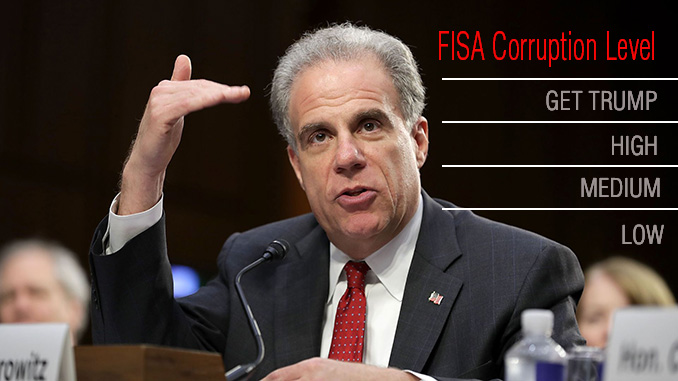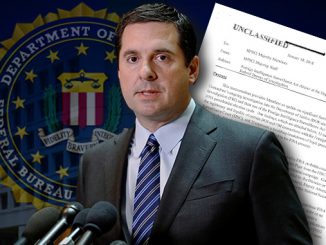
Inspector general finds lack of evidence, documentation to spy on Americans.
By Robert Romano
Justice Department Inspector General Michael Horowitz has followed up on his December 2019 Justice Department report on abuses under the Foreign Intelligence Surveillance Act (FISA) that occurred in 2016, where the Justice Department and intelligence agencies ordered spying on the Trump campaign and Republicans, the opposition party, in an election year on false allegations they were Russian agents.
This time, Horowitz conducted an analysis of a random sample of 29 FISA warrants, finding a similar lack of evidence and documentation to support the electronic surveillance on Americans authorized by the top-secret Foreign Intelligence Surveillance Court.
Horowitz found that, of the 29 applications, four lacked any information whatsoever supporting the applications and 25 lacked adequate support or contained errors. In other words, the random sample turned up a 100% “BS” rate. Under the Woods Procedures outlining FBI policy for FISA warrant applications, none of them should have been approved by the FISA judges, but all of them were.
Fortunately, FISA reauthorization is still on the table, with the current authority running out on May 30. We need to wait until after the Chinese coronavirus national emergency to fully address deficiencies in our surveillance system and reauthorize FISA.
As long as hearsay is a basis for wiretaps of Americans who are not being accused of crimes, the system will be abused. Intelligence likely often is hearsay, and you’re most probably not going to fly human sources into D.C. to have them appear before the FISA court or even have them phone in over a secure line. If they couldn’t use hearsay, then terrorists would get away. Trump advisor Carter Page wasn’t a terrorist, however. He wasn’t a Russian agent. In fact, he was apparently a CIA operative at one point on good terms with the agency, and they kept that from the FISA judge.
President Donald Trump, his campaign, and the Republican Party were given the same treatment al Qaeda gets with the same set of rules. The Steele dossier, penned by former UK spy Christopher Steele, was worse than hearsay. It was hearsay of hearsay. Neither Steele nor his source, who the FBI interviewed in January 2017, ever claimed to have had direct contact with the supposed Russian officials named in the dossier. In fact, the FBI did not begin the process of validating information from Steele—which was used as the basis for false Justice Department and intelligence agency allegations that Trump and his campaign were Russian agents—until after online news outlet “Buzzfeed” published the dossier in January 2017 when it began interviewing Steele’s sources. This was months after spying warrants had already been obtained on the campaign and renewed after the election.
How the witch hunt got as far as it did when the FBI knew in January 2017 that the sources were contradicting one another is a wonder. Special prosecutor Robert Mueller kept that out of his report. All he said was that they didn’t find a prosecutable case on the conspiracy with Russia aspect. He left out the part where one of the reasons for that was because Steele’s source had folded before Trump was even sworn into office.
The fact that similar problems apparently came up when Horowitz took a random sample of FISA warrants is beyond alarming.
Two years ago, when Americans for Limited Government gave Rep. Devin Nunes (R-Calif.) the “Congressman of the Year” award for 2017 for his efforts at exposing these abuses, we also gave him a bag of “FISA Warrant Approved” rubber stamps to give to his colleagues on the House Intelligence committee. It was tongue in cheek, but, as it turns out, the court really is a rubber stamp.
What information do the FISA judges verify when they deprive American citizens of their constitutional rights and record their lives? Apparently, they check nothing. Add to this the fact that verifying the information is not even required in the statute. Instead, they rely on a nonbinding FBI memorandum from 2001 to say information should be accurate.
The FISA system is beyond inadequate. It’s deliberate negligence by Congress and the Justice Department.
Robert Romano is the vice president of public policy at Americans for Limited Government.





